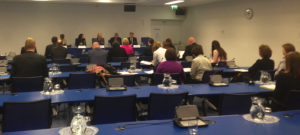23rd Session of the Commission on Crime Prevention and Criminal Justice Conference
By: Eion Oosterbaan
In May 2014, a panel discussion meeting took place at the United Nations Office of Drugs and Crime (UNODC) at its headquarters in Vienna, Austria. This discussion served as a side event to the Twenty-third session of the Commission on Crime Prevention and Criminal Justice Conference, specifically focused on the prevention, protection, and international cooperation against the use of new information technologies to abuse and/or exploit children. Eion Oosterbaan attended as a representative of Shared Hope International.
 In attendance to speak as members of the discussion panel were Tejal Jesrani of the UNODC, Bjorn-Erik Ludvigsen of NCIS Norway, Andrew Oosterbaan of the USDOJ Child Exploitation and Obscenity Section, and Ethel Quayle of the University of Edinburgh.
In attendance to speak as members of the discussion panel were Tejal Jesrani of the UNODC, Bjorn-Erik Ludvigsen of NCIS Norway, Andrew Oosterbaan of the USDOJ Child Exploitation and Obscenity Section, and Ethel Quayle of the University of Edinburgh.
The discussion opened up with an outline of the UNODC’s Study and Technical Assistance Programme to Combat the Misuse of Internet Communications Technology (ICTs) to Abuse and Exploit Children. The study pointed out the severe and increasing threat that developing technologies pose to our children, and how the use of technology has enhanced the ability of sexual predators to commit offenses. The use of ICTs has allowed predators to enhance their access to child victims, increase levels of harm and re-victimization, and it has increased the profitability of criminal enterprises. The severe difficulties of keeping pace with the criminal usage of this quickly evolving technology has presented law enforcement many issues with combating these criminals.
Currently, law enforcement is falling behind as they severely lack the proper resources to contain the criminal activity of these predators online. The scale of child abuse on the Internet is too large and widespread to completely eradicate. New developments in technology have allowed individuals to hide their identity (through the use of IP Address encryption and web browsers such as Tor) as they increase the frequency and ease of their online sexual offenses. It has become incredibly difficult to track and identify these skilled offenders, as they have found a haven through technology.
The experts on the panel stressed the importance of keeping up with the technology that sex offenders are now using. If mastered, the use of ICTs can actually be used as a tool for prevention and detection. Law enforcement has undertaken a policy of proactive investigation through the use of computer forensics to detect and identify online offenders, and they have recognized the need to increase the perceived sense of police presence on the Internet (“Fear of Detection”) as a key to crime prevention. The panelists also stressed the importance of increased information sharing as a key method to combating online child abuse. Internationally, we must be more willing to share/exchange information and we must establish a certain level of cooperation between Internet Service Providers (ISPs) and law enforcement.
Overall, this meeting/discussion served as a means to identify the significant threat that developing technologies pose to children, get the issues out there, and begin the process of creating a viable solution. The experts on the panel admitted that there currently exists no concrete solution, but stressed the importance of continuing the conversation and making this a subject of high priority.
Shared Hope International has joined in the effort to help prevent and combat the threat of sexual predators online, and recognizes the dangers that the misuse of technology presents. The use of ICTs has greatly enhanced the ability for buyers to find and make contact with victims of human trafficking. Girls are openly advertised on Internet websites like Backpage and Craigslist, yet the identities of the girls, their pimps, and their buyers remain protected and undetectable. Shared Hope has taken this issue head on, using its expertise and resources to provide Sex Trafficking Identification and Response Training while also tracking the human trafficking cases found on these ICTs.






